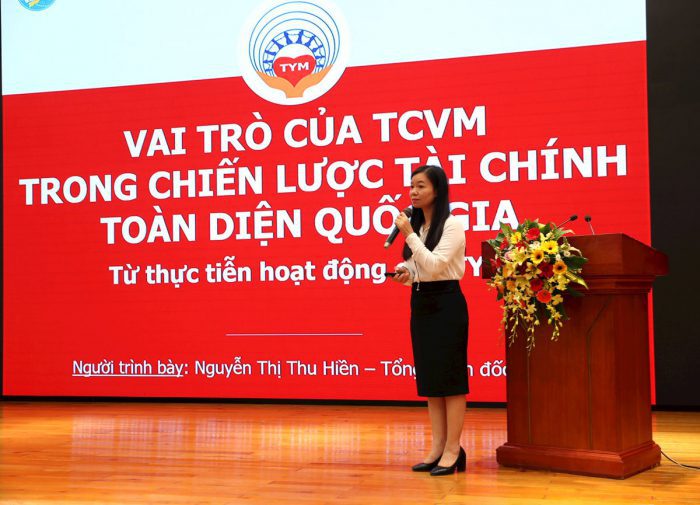It was one of the contents presented by Ms. Nguyen Thi Thu Hien, General Director of Tinh Thuong Microfinance Institution (TYM) – VWU at the Banking Industry Action Plan Implementation Conference. The conference aimed at implementing the National Inclusive Financial Strategy to 2025 with a vision to 2030 on September 10, 2020, in Hanoi. It was organized by the State Bank of Vietnam (SBV).

The conference was chaired by Ms. Nguyen Kim Anh – Deputy Governor of SBV. Attendees included leaders of departments, agencies, units of the SBV and its’ branches across the country, and leaders of commercial banks, credit institutions, and MFIs.
Sharing at the conference, Ms. Nguyen Kim Anh – Deputy Governor of the State Bank, said that the government has developed and implemented policies aiming at the target of inclusive finance. Those include prompt and sustainable poverty alleviation program for 61 poor districts, credit policy for agricultural and rural development, etc. The Deputy Governor also requested all units under SBV, credit institutions, intermediary accounting service providers, and MFIs to fully and deeply grasp the goals, tasks and solutions of the National Inclusive Financial Strategy to 2025 with a vision to 2030 and the Action Plan Banking sector for the implementation of the strategy.
At this conference, Ms. Nguyen Thi Thu Hien, General Director of Tinh Thuong Microfinance Institution TYM – VWU, on behalf of MFIs, gave a presentation on the role of microfinance in the National Inclusive Financial Strategy from TYM’s operations.
At the conference, Ms. Nguyen Thi Thu Hien affirmed: in the past time, to contribute to the implementation of the National Inclusive Financial Strategy and the Action Plan of the SBV, TYM has adjusted its organizational development strategy focusing on such contents as expanding geographical access (especially in rural and mountainous areas); diversifying products, cooperating with fintech and credit institutions; increasing activities to improve members’ capacity, especially in digital technology.
The speech also raised four main difficulties of MFIs in general, and of TYM in particular, when implementing inclusive finance, such as: (1) Expanding access to customers through tech-based distribution channels; (2) Barriers to access to domestic capital due to lack of collateral guarantee; (3) Limits in regulations on loan amounts and borrowers of MFIs; (5) Microfinance insurance is still in the pilot process and has not been approached by many microfinance customers.
Nguyen Thi Thu Hien also hoped that with SBV’s support in solving the above difficulties, microfinance will be able to focus on the following tasks to contribute to the implementation of inclusive financial to 2025:
- Increase the number of adults with trading accounts at credit institutions;
- Increase the number of adults with credit history information in the SBV’s credit information system;
- Increase the number of adults with savings at credit institutions;
- Increase the number of communes with financial service delivery units;
- Reduce the amount of cash transactions;
- Increase outstanding credit for agricultural and rural development;
- Increase the average GDP premium revenue;
At the end of the speech, Hien believes that with the legal framework and policies that facilitate the development of microfinance and with the determination, efforts and dynamism of MFIs, MFIs in general and TYM in particular will maximize their potentials, actively contribute to the action plans of SBV on inclusive finance.
(*) Financial inclusion generally means that financial services are provided to all members of the society, especially the disadvantaged in a convenient and appropriate way to meet their needs. It aims at creating livelihood opportunities, rotating investment capital flows and savings in the society, and promoting sustainable economic growth. Inclusive finance is considered one of the key factors of sustainable development.
Up to now, more than 60 countries have developed and implemented National Inclusive Financial Strategy. The implementation of inclusive financial has contributed significantly to poverty alleviation, job creation, livelihood increase for people, business development, financial stability support and sustainable business growth promotion.
In Vietnam, on January 22, 2020, the Prime Minister signed Decision No. 149/QD-TTg approving the National Inclusive Financial Strategy to 2025 with a vision to 2030.
